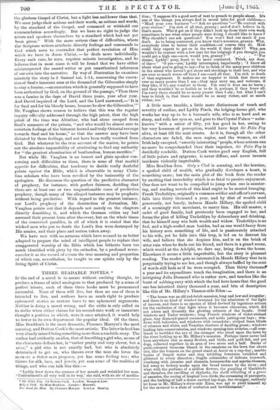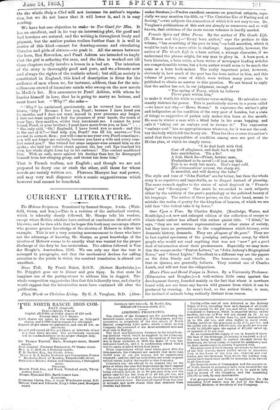THREE READABLE NOVELS * IF the end of a novel
is to amuse without exciting thought, to produce a frame of mind analogous to that produced by a sense of perfect leisure, each of these three books must be pronounced successful. None of them will live, but then no one of them is intended to live, and authors have as much right to produce ephemeral stories as orators have to use ephemeral arguments. Neither is doing a moral wrong, and the critic is only called on to strike when either claims for his second-rate work or immature thought a position in which, were it once attained, it would help to lower in its own department the popular ideal. Of the three, Miss Braddon's is the most dramatic, Florence Marryat's the most amusing, and Dutton Cook's the most artistic. The latter indeed has very closely missed being something more than a readable story. The author had evidently an idea, that of describing a girl who, as one of the characters defines her, is "rather pretty and very clever, but a minx," a girl who is not exactly bad, but who is absolutely determined to get on, who throws over the man she loves the moment a richer man proposes, yet has some feeling too ; who thirsts for silk, lace, and jewels, yet sees some of the realities of things, and who can talk like this :—
"Lyddy drew down the corners of her mouth and wrinkled her nose. :Contentment's all very well in its way,' she said, with an air of needita-
• Sir Felix Foy. By Dutton Cook. London: Sampson Low. Only a Clod. By Miss Braddon. London: Maxwell. To.? Om i for Him. By Florence Marryat. London Bentley.
tion ; 'I suppose it's a good sort of text to preach to people about. It's one of the things you always find in moral tales for good children— "Mind your own business "—" Ask no questions "—" Be content with your station." I'm sick of all that, granny ; and don't believe in it, that's more. Who'd get on if they didn't look up from their own work sometimes to see what other people were doing, I should like to know? Why shouldn't one ask questions? You won't find out much if you. don't. As to being contented, you know that's nonsense, granny. Why, everybody tries to better their condition—of course they do. How could they expect to get on in the world if they didn't? Why, you wouldn't be content with a low rent for the lodgings if you thought.you could get a high one—now, would you, granny ? '" . . • . "'For shame, Lyddy ! pray, learn to be more contented. Think, my dear, of the—' 0 yes—yes,' Lyddy interrupted, impatiently ; I know all about what you're going to say—I'm to think of the many poor children in the street who haven't got shoes and stockings to their feet, and who are ever so mach worse off than I am—and all that. I'm sick to death of that argument. It makes me no happier to think that there are ever so many poorer than I am—they may envy me, and welcome, if they like, if it's any comfort to them. Pm sure it does me no harm ; and they wouldn't be so foolish as to do it, perhaps, if they knew all. I'm sorry there should be so many poorer than I am ; but what I can't bear to think is, that there should be so many richer, and so much richer, too.' "
A little more trouble, a little more distinctness of touch and severity of outline, and Lyddy Finch, the lodging-house girl, who works her way up to be a baronet's wife, who is so hard and so sharp, and rolls her eyes so, and goes to the Crystal Palace " unbe- known" with a suitor of fifty, yet has good in her, owing to her very keenness of perception, would have kept Sir Felix Foy alive, at least till the next season. As it is, though all the• other characters are faded, the men copies, and the women, an old Irish lady excepted, "sweetly interesting " people, whose actions can no more be comprehended than their impulses, Sir Felix Foy is decidedly readable. Dutton Cook writes good easy English, full of little points and epigrams, is never diffuse, and never invents incidents violently improbable.
Miss Braddon does. Only a Clod is amusing, and the heroine, a spoiled child of wealth, who gradually developes a heart, is something more ; but the main plot of the book frets the reader by exciting that incredulity which is so fatal to passive enjoyment. One does not want to be compelled to jump when one is saunter- ing, and reading novels of this kind ought to be mental lounging. Frank Tredethlyn, originally a common soldier and officer's servant, falls into thirty thousand a year, and by dint of wealth used generously, not basely, induces Maude Hillary, the spoiled child of a seemingly rich merchant, to marry him. His old master, a cadet of good family, had previously been engaged to her, and forms the plan of killing Tredethlyn by debauchery and drinking, that he himself may win both wealth and widow. Tredethlyn is no fool, and a high-souled man besides, had as one would fancy from his history seen something of life, and is passionately attached to his wife, yet he falls into this trap, is led on to distrust his wife, and believe that she despises him, and is on the brink of utter ruin when he finds out his friend, and there is a grand scene, which would at the Adelphi, we dare say, bring down the house. Elsewhere it seems a little improbable, but the story is pleasant reading. The reader gets so interested in Maude Hillary that he is perpetually trying to see her, and though always baffled by the mist of words still feels as if he were occupied. Then thirty thousand' a year and its expenditure touch the imagination, and there is an intriguing Julia Desmond who is rather new, and touches like the burst of sobbing envy with which the bad hero hears that the good one has inherited thirty thousand a year, and bits of description like this of Mr. Hillary's Thames-side Eden:-
" The house was an old red-brick mansion, long and low and irregular; and there is no kind of window invented for the admission of the light of heaven, and there is no species of blind devised by ingenious artisan for the exclusion of that light when it becomes obnoxious, which did not adorn and diversify the glowing crimson of the façade. Oriel windows and Tudor windows ; long French windows of violet-stained glass, tiny diamond-paned casements, and noble jutting-out bays ; win- dows with balconies, and windows with verandahs ; striped linen blinds of crimson and white, and Venetian shutters of dazzling green ; windows leading into conservatories, and windows opening into aviaries,—all com- bined to bewilder the eye of the stranger who stood upon the lawn by the river looking up at Mr. Hillary's mansion. Perhaps there never had been anywhere else so many flowers, and birds, and gold-fish, and pet dogs, collected together in an area of two acres and a half. Banks of parti-coloured blossoms blazed in the sunshine on the lawn tier above tier, like the bonnets on the grand stand at Ascot on a cup-day ; marble basins of limpid water and tiny trickling fountains twinkled and glittered in every direction ; fragile colonnades of delicate ironwork, overhung with jasmine and clematis, honeysuckle and myrtle-blossom, led away to bowery nooks upon the broad terrace by the river ; and what with the perfume of a million flowers, the gurgling of blackbirds and thrushes, the carolling of skylarks, the shrill whistling of a grove of canaries, the cooing of tropical love-birds, the screaming of paroquets, and the barking of half a dozen excited lap-dogs, the stranger, suddenly let loose in Mr. Ellllary's river-side Eden, was apt to yield himself up for the moment to a state of confusion and bewilderment." On the Whole Only a-Clod will not increase- its author's- repute- tion, but we do not know that it will- lower it, and it is easy
reading.
We have but one objection to make- to Too•Good for Him. It has an excellent, and in its way an.intereatingplot, the good'and bad heroines are natural, and the writing is throughout lively and piquant, but the -author pushes realism further than it is well in stories of this-kind—meant for drawing-rooms and circulating libraries and-girls-of sixteen—to push it. All the scenes between the hero, Rex Reverdon, and Pearl Ashton are intended to.imply that the girl is seducing the man, and the idea is workectout till those chapters really involve a lesson in a bad art. The intention of the story is thoroughly good and pure, and we advocate now and always the rights of the realistic school ; but still, as society is constituted in England, this kind of description is fitter for the audience of men whom we, for instance, address, than for the mis- cellaneous crowd of immature minds who swoop on the new novels in Mudie's list. Rex announces to Pearl Ashton, with whom he fancies himself in love, that he is going to marry an heiress, and must leave her. "Why?" she asks- " 'Why?' he exclaimed, passionately, as he covered her face with kisses,.' why ? Because I love you, Pearl ; because I have loved you for months, and I dare not trust myself in your presence any longer. I dare not trust myself to feel the pressure of your hands, the touch of your lips ; they madden, whilst they intoxicate me. I cannot be your friend, Pearl, or your brother; I must have more from you, or less.'" . . . " She only said, Oh ! Reginald, I have loved you so much : and this is the end of it God help you, Pearl!' was all his answer.= You are not in earnest, Rex ; you will come to see your own Pearl sometimes ; you will not forget me entirely, because you have a wife and every com- fort round•you?' She twined her arms serpent-wiserareund him as she spoke ; she laid her velvet cheek against his, her soft lips touched his own, her whole slight form lay in his embrace ! The contact maddened him. With an oath, more against his destiny than her, he disengaged himself from herclinging grasp, and thrust her from him."
That is French realism, not English ; and though we are not prepared to decry one or exalt the other, still those for whom novels are mainly written are. Florence Marryat has real power, an may very well dispense with a scenic suggestiveness which however real cannot be beneficial.































 Previous page
Previous page